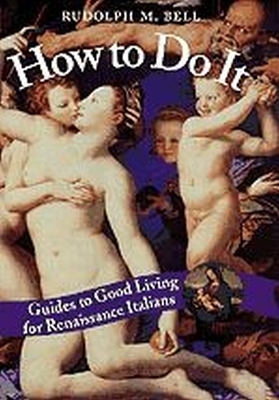
How to Do It
Guides to Good Living for Renaissance Italians
Seiten
1999
University of Chicago Press (Verlag)
978-0-226-04210-7 (ISBN)
University of Chicago Press (Verlag)
978-0-226-04210-7 (ISBN)
This work shows 16th-century Italy from an alternative perspective: through advice manuals which were staples in the households of middlebrow Italians just trying to lead a better life.
Hope to conceive a boy? Tie a tourniquet around your husband's left testicle. Pregnant and fear a weak or malformed baby? Frequent hearty laughter should reduce the risk. And if you're a teenager of good repute, avoid dancing at all costs and stay away from wine, cosmetics, and flashy dress. What may seem quirky to today's readers certainly wasn't to its original audience - Renaissance Italians. They read advice manuals prodigiously, seeking guidance from the latest books by best-selling alchemists and snake-oil peddlers like Mrs. Isabella Cortese and Dr. Leonardo Fioravanti with an avidity not bestowed even on a Dante or a Machiavelli. This work shows 16th-century Italy from an alternative perspective: through manuals which were staples in the households of middlebrow Italians just trying to lead a better life. Rudolph M. Bell uncovers a culture much like our own in which people sought advice for everything from reining in a wayward spouse to running an efficient household.
Italians who faced such timeless challenges turned to these books, which were written specifically for families of moderate means, complete with indexes, tables of contents, and marginal summaries making them easy to consult as problems arose.
Hope to conceive a boy? Tie a tourniquet around your husband's left testicle. Pregnant and fear a weak or malformed baby? Frequent hearty laughter should reduce the risk. And if you're a teenager of good repute, avoid dancing at all costs and stay away from wine, cosmetics, and flashy dress. What may seem quirky to today's readers certainly wasn't to its original audience - Renaissance Italians. They read advice manuals prodigiously, seeking guidance from the latest books by best-selling alchemists and snake-oil peddlers like Mrs. Isabella Cortese and Dr. Leonardo Fioravanti with an avidity not bestowed even on a Dante or a Machiavelli. This work shows 16th-century Italy from an alternative perspective: through manuals which were staples in the households of middlebrow Italians just trying to lead a better life. Rudolph M. Bell uncovers a culture much like our own in which people sought advice for everything from reining in a wayward spouse to running an efficient household.
Italians who faced such timeless challenges turned to these books, which were written specifically for families of moderate means, complete with indexes, tables of contents, and marginal summaries making them easy to consult as problems arose.
Rudolph M. Bell, professor of history at Rutgers University, is the author of a number of books in Italian history, among them Fate and Honor, Family and Village: Demographic and Cultural Change in Rural Italy Since 1800, Holy Anorexia, How to Do It: Guides to Good Living for Renaissance Italians, and The Voices of Gemma Galgani: The Life and Afterlife of a Modern Saint (with Cristina Mazzoni), all published by the University of Chicago Press.
| Erscheint lt. Verlag | 31.3.1999 |
|---|---|
| Reihe/Serie | Emersion: Emergent Village resources for communities of faith |
| Sprache | englisch |
| Maße | 16 x 24 mm |
| Gewicht | 709 g |
| Themenwelt | Geschichte ► Allgemeine Geschichte ► Neuzeit (bis 1918) |
| Geisteswissenschaften ► Geschichte ► Regional- / Ländergeschichte | |
| Geschichte ► Teilgebiete der Geschichte ► Kulturgeschichte | |
| ISBN-10 | 0-226-04210-3 / 0226042103 |
| ISBN-13 | 978-0-226-04210-7 / 9780226042107 |
| Zustand | Neuware |
| Haben Sie eine Frage zum Produkt? |
Mehr entdecken
aus dem Bereich
aus dem Bereich
Giordano Bruno - ein ketzerisches Leben
Buch | Hardcover (2024)
C.H.Beck (Verlag)
29,90 €
das dramatische 16. Jahrhundert
Buch | Hardcover (2024)
Rowohlt Berlin (Verlag)
34,00 €


